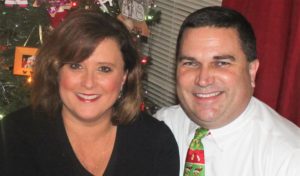By Laura Thill
Tri-anim sales manager has discovered that value comes in many forms, whether in the service he provides for his customers or the love he has given to his children and foster children.
Attila Morgan takes nothing for granted. A proud father of five, foster parent to many more, and a successful regional manager for Tri-anim, he’s achieved a happy balance between family and work. But, that’s not always the case for everyone, he notes. “Though the years, I’ve become more and more understanding that many people are dealing with challenges in their life,” he says. “At the end of every purchase order we receive, there’s a person in need of care. We are providing the resources to the clinicians who are at the patient’s bedside, providing the care they need.”
Clinical roots
Medical products sales wasn’t always on Morgan’s radar. Following high school graduation, he joined the U.S. Army. “I was looking to serve my country, and I needed the structure,” he says. For three years, he worked in communications intelligence. Although his job took him as far as South Korea, he never really left the signal corps, he points out.
Soon after, when Morgan moved to Atlanta and joined the National Guard, “they didn’t have much need for someone with a signal background,” he points out. But, they did happen to need a respiratory therapist. He stayed with the National Guard for four years, in which time he acquired medic training and attended respiratory therapy school. In 1992, he moved to Alabama, where he was hired by East Alabama Medical Center as a staff respiratory therapist, eventually becoming the manager of the 350-bed facility’s respiratory therapy, neurology, pulmonary rehabilitation and sleep disorders departments.
“During that time, I was a customer of Tri-anim,” he explains. “I had an excellent relationship with my sales rep who, like me, had a clinical background. When he was ready to leave Tri-anim, he approached me about taking his position. At first, I wasn’t sure about the move. I had no sales experience. But, the company looked like a great organization, with a culture of honesty and integrity. I joined in 2004 as an account manager (eventually becoming a regional manager) and have loved it ever since!”
Value-based sales
Since joining Tri-anim, the sales process has become increasingly complicated – and challenging – for both sales reps and their clinician customers, he notes. Changes in reimbursement and purchasing structures, and the need for internal approval at medical facilities and practices, have added steps to the sales process, he points out. “Few physicians or clinicians today can make an immediate decision about a purchase,” he says. Gone are the days when reps could make a sale simply because they were friendly with the customer.
“Today, we must be a consultative resource for our customers and show them the value of the products we introduce,” he continues. “At the end of the day, we must be able to document exactly how we will help our customers provide better care to their patients. Indeed, one of the worst things a new sales rep can do is to “pull a product out of their bag on their first appointment with a customer and try to sell it,” he says. “You can’t sell to someone who doesn’t know you. I tell my new sales reps to introduce themselves to their customers and get to know them.” It can be embarrassing when they try to sell a product without realizing that the customer has been buying it for years, he adds.
“Clinicians are looking to make outcome-based and value-based purchases,” says Morgan, and sales reps “must become more informed about their products and services in order to show the value of them.” To do so, in many cases, distributor sales reps have strengthened their relationship with their manufacturer partners. “We’ve always had a strong relationship with our [manufacturer partners], but recently, it’s grown even stronger,” he says. Customers need to see a consistent message from both suppliers and vendors, he says. “[As such], our level of communication has gotten stronger. Our manufacturer partners regard us as an extension of their team. Together, we can build strong relationships with customers.”
Giving back
Around the time Morgan’s oldest daughter turned 16, he and his wife, Wendy, decided the time was right to become foster parents. “We have been blessed with five healthy children and wanted to give back,” he says. Over the next eight years, the couple fostered six children full time and an additional seven children for short periods to relieve other foster parents who needed time off. “Our foster children ranged from 12 weeks of age to 5 years,” he says. “At any given time, we had two foster children living with us between 10 months to 2 years.
“There’s a lot of joy in fostering,” he continues. But, it’s easy to get attached to the children and difficult to “let go,” particularly after a couple of years, he notes. Fostering can also be a mixed bag emotionally, with a lot of uncertainty involved, he adds. “Children may show up on your doorstep at 2 a.m. with only the clothes on their back.”
Indeed, it was difficult to anticipate the challenges facing the children, or the impact that foster parents and siblings could have on them. “We received a 12-week-old baby who had been terribly abused and were told he might not make it,” Morgan recalls. “He came to us with a feeding tube, but after a year, he was walking around the furniture! [In another instance], we had a couple of girls (sisters) live with us for two years. It was rough at the start. I remember the first Sunday we had them – Palm Sunday – we were getting ready for church and one had a complete meltdown for an hour.” But, after two years of living in a structured environment, they were very calm, he points out.
Although Morgan and his family have not had an opportunity to see any of the children after they moved on, they have received some positive updates. “A 5-year-old boy we had eventually returned to live with his dad,” he says. And, we heard the two girls who lived with us for a couple of years were adopted by the foster parents who had their sister.”
Fostering “definitely has been rewarding, and the experience has taught our children that not everyone has the same opportunities [in life],” he says. “I’ve become much more understanding through the years that some people are dealing with some real challenges – or, [in the case of work], their patients are.” It’s all a matter of perspective, he adds.


I broke my cell phone tonight and can’t find your phone numbers. Please wish Brittan a Happy Birthday for me and call me in the next day or so with your phone numbers. thanks Dad